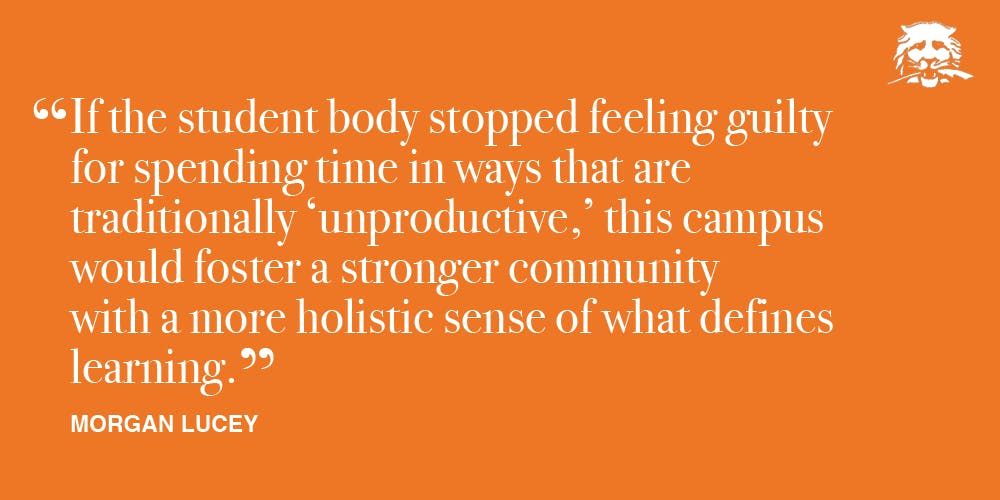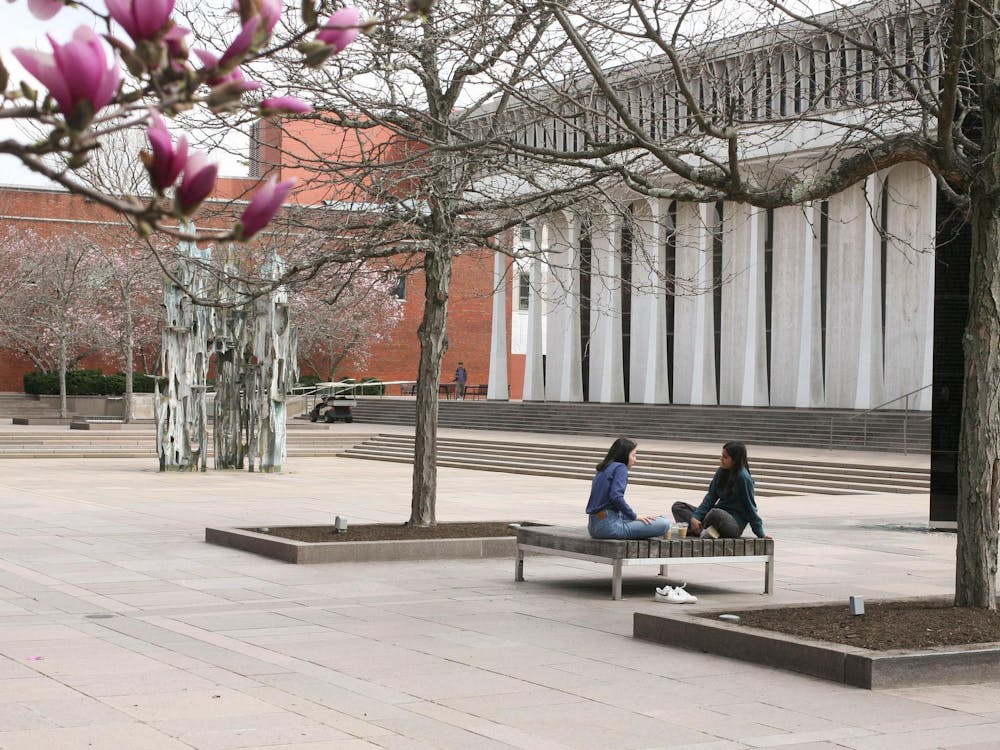The feeling that nothing has been accomplished over the weekend haunts much of Princeton’s campus each Sunday night. There are endless declarations of “I didn’t do anything this weekend” or “I was so unproductive.” But if you ask almost any of the people making these declarations what they did that weekend, they will describe a weekend that is actually far from unproductive. Most people spend their down time attending talks, dance and theatre performances, or sports games. These events, though a distraction from schoolwork, add many important experiences to students’ time at Princeton, and allow students to form connections that cannot be found inside in a lecture hall. Perhaps it’s time for us to recognize that time spent building friendships and building community is just as productive as time spent working on schoolwork.
This past Saturday, I began the day determined to spend several hours working, after a week that I considered to be far too unproductive. This plan was quickly derailed when I ran into several friends at brunch, and spent an hour chatting over omelettes and coffee. We settled into the Lewis Center for the Arts afterwards, determined to check several items off of our to-do lists. In the middle of trying to accomplish this, we were surprised to find that the Forum was actually the center of a senior thesis dance performance choreographed by Natalie Plonk ’18. Only a few hours later, I was convinced to attend a men’s volleyball game with a friend who had never seen competitive volleyball in person before. Thus, my plan to work for at least eight hours quickly turned into (a generous) four.
But the day was productive in a way that goes beyond schoolwork. Brunch represented time with friends, something that is hard to coordinate given everyone’s busy schedules. It was certainly hard to get work done with 10 dancers moving throughout the tables of the Lewis atrium, but we gained something far more valuable than a few pages of reading during that time: We saw a performance into which several close friends had clearly been putting a large amount of time and work, something we may not have otherwise attended, in favor of trying to be more efficient. Even though both of us are in student organizations with members of the men’s volleyball team, we had never gone out of our way to support them during their matches. If I had stuck to my plan of working all day, without compromise, than I would have missed out on all of these experiences.
This leads me to wonder what other events and connections students miss out on because they are too concerned with being productive. Every week, there is an endless supply of panels, talks, performances, and sports games. We could effectively fill our schedules with these events, but there is a certain amount of guilt that follows after attending. Rather, it is considered more valuable to fill our time with hours working in Firestone Library, or worse, alone in our rooms. Of course, there will be times where this is necessary; midterm, thesis, and finals periods are certainly worth spending in a library. But obtaining a few extra points on a problem set seems less important when one considers what the other events have to offer.
Dance and theatre performances represent hours of hard work put in by both performers and the people backstage; their creativity is often astounding. Sports games are similar, in that it is truly incredible how many hours are put into a few seconds on the clock. Just a few more people in the stands and audiences makes a huge difference in the sense of support and admiration for the people on stage or on the field. Attending the events led by your peers creates a sense of community on this campus, one built around mutual support. On a smaller scale, the long dining hall meals or time spent chatting with friends can make a huge difference in making this campus feel like home.
All of these events offer many benefits for those who attend. Considering some of the amazing speakers that have come to campus in recent years, it is easy to see what one gains from attending one of the many talks and panels that occur each week. An hour spent learning something new — recently, there have been lectures ranging from cryptocurrency to yoga for battling eating disorders — is always valuable, even if it is not directly related to the work required for students’ classes. These events are just as productive as an hour spent in Firestone, as they often offer knowledge that either expands on what we learn in the classroom, or that cannot be found in the classroom at all.
If the student body stopped feeling guilty for spending time in ways that are traditionally “unproductive,” this campus would foster a stronger community with a more holistic sense of what defines learning. Though what we learn in our lectures and seminars is valuable, there is value in the experiences found in other aspects of campus. If this value was more widely recognized, attendance at the many talks, performances, and athletic endeavors would soar. Perhaps we could stop comparing how much time we spent in libraries and start discussing the what was said by a groundbreaking speaker, or how one of our many sports teams played in recent events. Thus, I am calling for an end to the feeling of having been “unproductive” when time was spent engaging with other aspects of Princeton’s campus outside of the classroom or library. Let’s recognize that building friendships and learning even the most irrelevant information is productive in a different way, one that is equally as valuable.
Morgan Lucey is a junior studying neuroscience from Scottsdale, Ariz. She can be reached at mslucey@princeton.edu.








